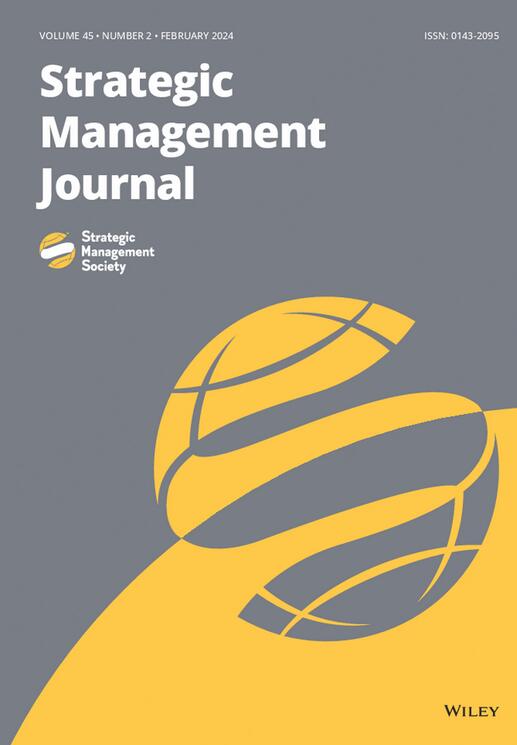Windows versus waves of opportunity: How reputation alters venture capital firms' resource mobilization
IF 7.2
1区 管理学
Q1 BUSINESS
引用次数: 0
Abstract
Abstract Research Summary This paper investigates how reputation affects firm responses to resource mobilization opportunities. We theorize that lower‐reputation firms are likely to be particularly responsive to resource mobilization opportunities because they are otherwise constrained. By contrast, higher‐reputation firms have access to greater resource supply and may self‐restrain demand. We test these arguments in the context of venture capital (VC) firms raising investment funds. We indeed find that lower‐reputation VCs are more responsive to opportunities presented by recent successes. Unexpectedly, we find that high‐reputation VCs are more responsive to market‐wide heat. Through multi‐method follow‐on analyses, we propose that while recent successes constitute “windows of opportunity” upon which firms act with individual discretion, hot market conditions serve as “waves of opportunity,” exerting a push on the resource mobilization of all firms and influencing their propensity toward scaling up. Managerial Summary We explore how low‐ and high‐reputation venture capital (VC) firms respond to fundraising opportunities such as recent successes or hot market conditions. We show that low‐reputation VCs are more likely to fundraise from limited partners in response to firm‐specific “windows of opportunity” (such as after a portfolio company IPO) because it is a rare chance to attract resource provider attention. By contrast, high‐reputation firms are more likely to fundraise at their own pace, regardless of short‐term successes. However, we unexpectedly find that high‐reputation firms are more likely than low‐reputation ones to take advantage of market‐wide “waves of opportunity” (i.e., hot markets), likely because they benefit from increased fundraising process efficiency. Our study illustrates how hot market periods may be unusually advantageous fundraising opportunities for high‐reputation firms and may be a key driver of when such firms scale up.窗口与机会浪潮:声誉如何改变风险投资公司的资源动员
摘要本文研究了声誉如何影响企业对资源调动机会的反应。我们的理论认为,声誉较低的公司可能对资源调动机会特别敏感,因为它们在其他方面受到限制。相比之下,声誉较高的公司可以获得更多的资源供应,并可能自我约束需求。我们在风险投资(VC)公司筹集投资基金的背景下检验这些论点。我们确实发现,声誉较低的风投公司对最近的成功所带来的机会更敏感。出乎意料的是,我们发现高声誉的风险投资公司对整个市场的热度更敏感。通过多方法后续分析,我们提出,虽然最近的成功构成了“机会之窗”,企业可以在此基础上自主行事,但火热的市场条件充当了“机会之波”,推动了所有企业的资源动员,并影响了它们扩大规模的倾向。我们探讨低声誉和高声誉风险投资(VC)公司如何应对融资机会,如最近的成功或热门的市场条件。我们发现,声誉较低的风投更有可能在公司特定的“机会之窗”(如投资组合公司IPO之后)从有限合伙人那里筹集资金,因为这是吸引资源提供商注意的难得机会。相比之下,高声誉的公司更有可能按照自己的节奏筹集资金,而不管短期成功与否。然而,我们意外地发现,声誉高的公司比声誉低的公司更有可能利用市场范围内的“机会浪潮”(即热点市场),这可能是因为它们受益于融资流程效率的提高。我们的研究表明,对于声誉高的公司来说,火爆的市场时期可能是非常有利的融资机会,并且可能是这些公司何时扩大规模的关键驱动因素。
本文章由计算机程序翻译,如有差异,请以英文原文为准。
求助全文
约1分钟内获得全文
求助全文
来源期刊

Strategic Management Journal
Multiple-
CiteScore
13.70
自引率
8.40%
发文量
109
期刊介绍:
At the Strategic Management Journal, we are committed to publishing top-tier research that addresses key questions in the field of strategic management and captivates scholars in this area. Our publication welcomes manuscripts covering a wide range of topics, perspectives, and research methodologies. As a result, our editorial decisions truly embrace the diversity inherent in the field.
 求助内容:
求助内容: 应助结果提醒方式:
应助结果提醒方式:


